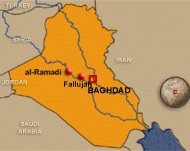Iraqi merchants in Anbar look to Syria
Fear of abductions and attacks on commercial convoys has prompted merchants in Iraq’s western Anbar province to divert their trade routes from Baghdad to Syria.

The decision to deal directly with Syrian goods and products came after several drivers from the Anbar province were found killed along the highways to Baghdad. Their trucks hauling produce and other commodities had been looted and burned.
Iraqi policemen who patrol the highways say they are unable to challenge the armed gangs and militias that operate near the towns such as Ramadi and Falluja that lie between much of Anbar province and Baghdad.
“We don’t have the communications means to call for help in emergency cases,” police captain Jasem al-Dulaymi, said.
“We even don’t have enough guns to arrest the gangs or to protect ourselves from the attacks of the thieves.”
In this lawless environment, many drivers say that the risk of being caught by ”death squads” is now too high for them to venture near Baghdad.
As a result, rather than sending goods to and from the Iraqi capital, an impromptu trading bloc has instead developed between Anbar province and neighbouring Syria.
Goods including vegetables, fruits, kitchen wares, water tanks and pipes, cement for construction projects and filters, flow into Iraq, while dates and other Iraqi fruit from the Iraqi towns of Qaim and Rudba are exported into Syria.
Made in Syria
Walking through the marketplaces of such Anbar towns as Hiyt or Falluja, one comes across many products with the label ”Made in Syria”.
A local trader in Hiyt said that he had been using the Thuraya mobile phone network and the internet to secure commercial deals with business people in Damascus and Aleppo.
 |
|
Western Iraq is cut off from Baghdad by Ramadi and Falluja |
While acknowledging that the distance between Hiyt and Baghdad is less than 170km, he said the dangers in addition to the constant security roadblocks and checkpoints made travelling to Damascus 700km away much more lucrative.
He explained that many merchants in Anbar tried to secure some kind of protection for their drivers hauling goods and wares to Baghdad, but persistent death threats from sectarian militias proved too much to ignore.
Convoy danger
Drivers also said that whichever road they took – whether to Baghdad, Syria or Jordan – they still had to contend with the risk of being shot at and killed by US patrols or convoys.
“When you encounter an American military convoy on the highway of the desert you have to be patient,” Walid Hazim, a taxi driver working on the route between Syria and Iraq, said.
The Iraqi traders say they expect trade across the Syrian Al-Walid border post to increase over the coming months, pointing out that the booming Anbar-Syria trade suits both sides.
The Iraqi merchants, they say, by operating largely with the knowledge of the government can avoid taxes and duties, while the Syrians see Al-Anbar as a valuable new market for their goods.